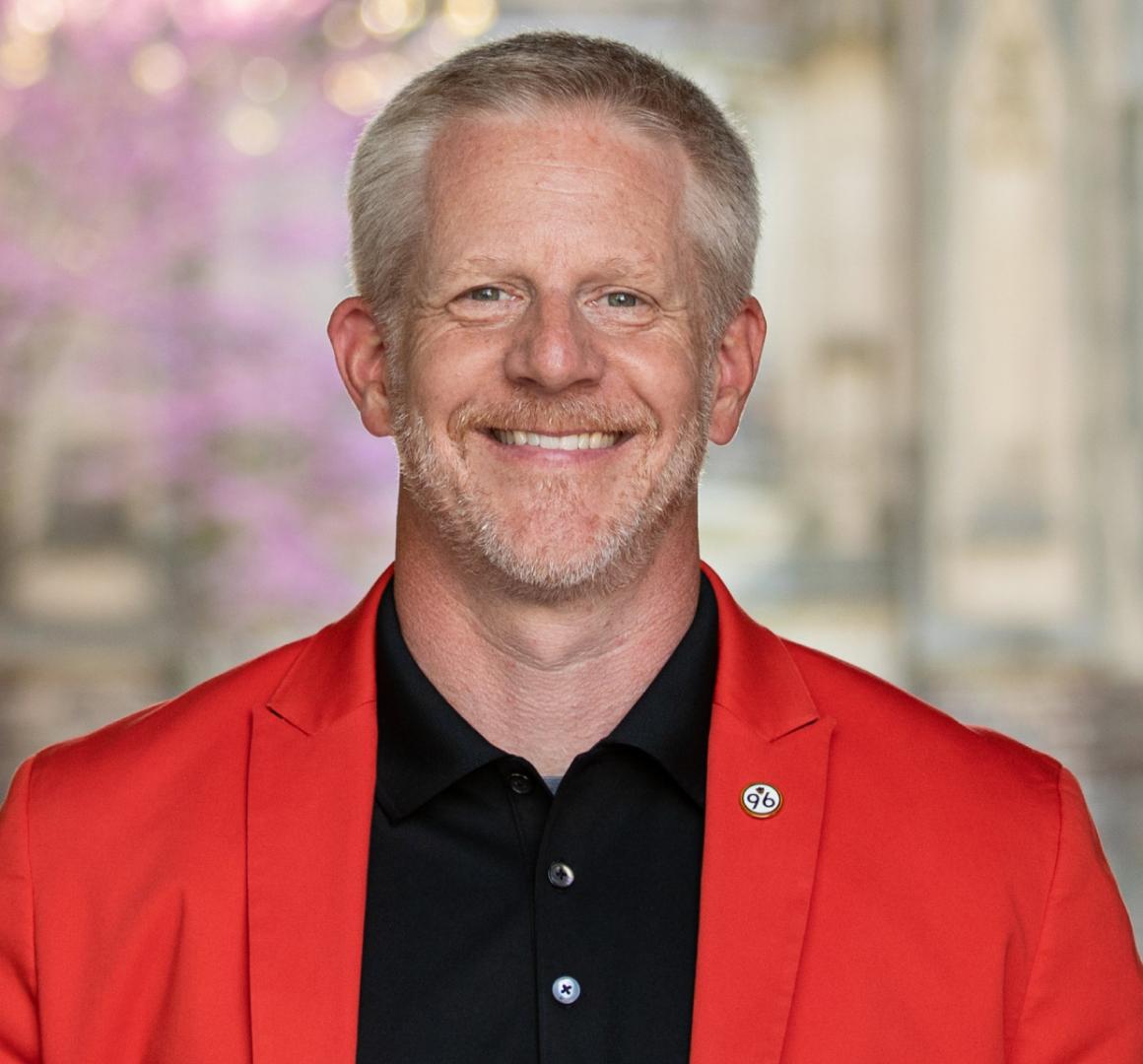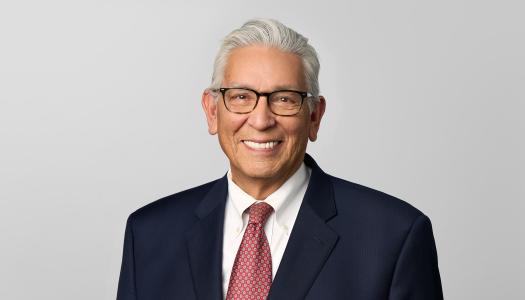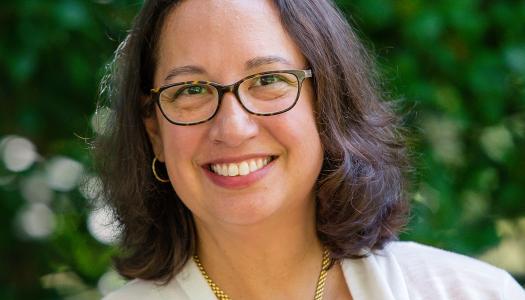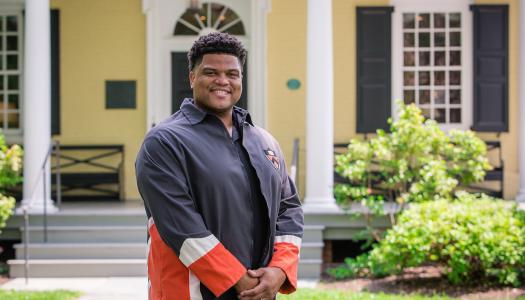5 Questions with Rich Holland ’96

Rich Holland ’96 served as president of the Alumni Association and chair of the Alumni Council during an unprecedented time, with COVID-19 restrictions impacting his role in leading the alumni body and the ability of Princetonians to gather, both on and off campus.
While the world in many ways had to hit pause, Holland did not, finding opportunities to move the work of the Alumni Council forward and encouraging alumni to continue celebrating their unflagging Tiger spirit with creative online events. Quite presciently, Holland introduced the theme of his tenure, “Princeton is where you are,” before the pandemic hit, which couldn’t have been a more fitting tagline.
Below, Holland, who concluded his term on June 30, answers five questions about his work as president and chair, why he continues to volunteer Princeton and why he can’t wait to walk through the Holder courtyard again.
Who or what inspired you to first volunteer for Princeton?
Volunteering for Princeton, first and foremost, is fun for me, but it’s also quite fulfilling. Princeton has given me so much, and Princeton gives so much to so many.
Volunteering allows me to give back to Princeton, and, specific to this role, to serve as an ambassador for Princeton, to help yell from the mountaintops all the good that Princeton is doing.
As for some of my earliest inspirations, my experiences with the Princeton Club of DC, then led by Tiny Morgan from the Great Class of ’66, set a very high bar for a lifelong Princeton experience, and I still borrow best practices from those formative years as a recent grad.
Other than serving as chair/vice chair of the Alumni Chair, what volunteer opportunities did you enjoy most or were most meaningful to you?
Serving in regional volunteer roles is a blast! It’s difficult to choose one favorite. As a 22-year old recent grad in Washington, D.C., organizing happy hours for the Princeton Club was really fun, serving as a young alumni coordinator. I recall one gathering in particular, an event with 100-plus in attendance to view the men’s basketball team play in the 1997 tourney – that was pretty cool.
One of the most fulfilling was serving as a co-chair of the Alumni Schools Committee in Georgia, helping to coordinate something so Princeton, our alumni interviews. My role was to find alumni interested in interviewing the rapidly-growing number of applicants, and it didn’t feel like a job at all. As we all know, Princeton alumni start on “yes,” and I met some life-long friends.
What was the greatest challenge/opportunity as chair of the Alumni Council?
The greatest challenge indeed provided the greatest opportunity, too. Without the ability to gather on campus, we, along with the rest of the world, had to pivot our interactions to virtual gatherings. In a typical year, the Alumni Council Executive Committee would gather three times on campus, and the chair of the Alumni Council would be on campus 13-15 times for various other events, depending on the year. So, we had to adapt from hosting a small number of in-person events with a relatively small number of people to planning a greater number of virtual events with fewer hurdles to attend.
The Alumni Engagement team on campus made this herculean effort look simple. And the results were amazing! We still conducted our three traditional meetings (albeit virtual), but, without the time and cost required of travel, we were also able to gather much more often. Instead of a small number of heavy lifts, we now had the opportunity for a greater number of lighter, yet more deliberate, lifts. In many cases, alumni volunteer leaders were able to meet with other volunteers they typically hadn’t met with before, and new relationships and lines of communication were formed. This fostered a more collaborative and more inclusive experience.
More personally, I missed Reunions so dearly. Other than the P-Rade, I missed attending the Old Guard Luncheon the most. And, of course, I long to walk through the courtyard of Holder Hall, my sophomore year home.
The theme of your tenure, “Princeton is where you are,” was prescient given the pandemic and Princetonians’ inability to gather. How do you think Princetonians answered your theme throughout the regions?
Blown away! Simply blown away!
The theme was intended to be both a charge to volunteer leaders – to help ensure that Princetonians of all geographies, at all stages of life, and of all stripes could feel a warm Tiger embrace – and an aspirational declaration about the Princeton alumni experience. Little did we know, when we coined this theme in September of 2019, how important this idea would become.
Princetonians connected more frequently and more creatively than ever, truly leaning into virtual alumni gatherings of all flavors. Regions co-hosted events with one another across the country and across the globe, something essentially non-existent pre-COVID. And joining your favorite Affiliated Group event or Forward Fest was just a click away. Princetonians didn’t settle for waiting to gather in person – they demanded Princeton in their homes, and they made it happen! Not surprising.
And I am so energized by what this means for alumni engagement in a post-COVID world, combining the best of how we connected pre-pandemic with highlights from this past year.
During your tenure, you tackled many important issues, like racial and social injustice, charging the Alumni Council with having important conversations around these topics. What are your hopes for the future of the work of the Alumni Council?
With such a talented group of volunteer leaders committed to our informal motto of serving our nation and serving humanity, how could we not? The time was right, and the forum was right. I deserve no credit – the Alumni Council at large embraced these efforts to raise the level of discourse and to ensure our body better represents the greater alumni community.
We pushed on our conventions and comfort zones throughout four DEI [Diversity, Equity and Inclusion] training sessions, and we drafted a statement outlining our commitment to inclusivity and diversity within our volunteer organizations. We are most hopeful that these efforts are the beginning of a robust journey towards a shared understanding, a common vernacular and history together. After all, Princeton cannot be where you are if Princeton does not truly embrace who you are.


